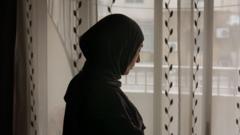The story of Rihab Faour illustrates the devastating impact of the Israel-Hezbollah conflict in Lebanon. Following Hamas’s attack on Israel in October 2023, the conflict escalated, forcing Rihab and her family to flee their home multiple times as Israeli bombs targeted areas across Lebanon.
Initially, Rihab, her husband Saeed, and their daughters Tia (8) and Naya (6) moved from their village to her parents’ home in Dahieh, a Beirut suburb. They continued to relocate as Israeli strikes expanded, moving through several neighborhoods and eventually settling in a new apartment in the Basta area of central Beirut.
On October 10th, a US-made Jdam bomb struck their building at 8 pm, just half an hour after the family had arrived. The strike killed 22 people, including Saeed and both daughters. The Israeli military was reportedly targeting Hezbollah official Wafiq Safa, though he was not confirmed to be among the casualties.
Rihab woke up in Zahraa Hospital with severe injuries, including multiple surgeries requiring screws in her spine and arm. Her family initially concealed the deaths of her husband and children, fearing the shock would impede her recovery. After two weeks, she was told the devastating truth.
Six weeks after the strike, Rihab struggled with her grief and physical recovery. She remembered her daughters’ love for drawing, playing teacher, and watching TikTok videos. Saeed and Tia were buried quickly in a temporary grave, with Naya buried two weeks later.
The tragedy continued as subsequent Israeli air strikes hit the cemetery where her family was buried and destroyed their family home in Dahieh. The strike also ruined two new, unworn school uniforms Rihab had purchased for her daughters.
A recent ceasefire allowed displaced people to return to southern Lebanon, though Rihab cannot travel due to her medical condition. Her family’s village was heavily bombed, and their home destroyed.
Ironically, Wafiq Safa, the reported target of the strike that killed her family, emerged publicly after the incident, apparently unharmed.
Despite her immense loss, Rihab is tentatively considering returning to her interrupted legal studies. “I am going to need something to fill my days,” she said, reflecting her determination to move forward despite the profound trauma she has experienced.
The article, reported by the BBC, highlights the human cost of the ongoing conflict, showing how civilian families like Rihab’s are caught in the crossfire of geopolitical tensions, with devastating and irreversible consequences.



